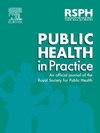Black US military veterans respond favourably to a booklet using narratives to normalise shared decision-making
IF 1.9
Q2 PUBLIC, ENVIRONMENTAL & OCCUPATIONAL HEALTH
引用次数: 0
Abstract
Background
Black Americans, including military veterans, experience worse health outcomes. In the United States, Black men have the highest lung cancer mortality and are less likely to undergo lung cancer screening (LCS). Mistrust caused by systemic racism can inhibit their participation in clinical conversations like shared decision-making (SDM). We sought to empower Black veterans to participate in SDM for LCS by normalising patients advocating for what matters most to them in clinical care decisions. We evaluated the impact of a booklet co-designed with veterans that includes four veteran narratives. They describe how each veteran began to trust their providers and engage in clinical conversations like SDM for LCS.
Study design
Pre-post intervention pilot study using surveys to evaluate the impact of the booklet and reactions to the narratives.
Methods
The survey was mailed to a random national sample of 450 Black veterans eligible for LCS but not yet screened. Respondents to the baseline survey were mailed the booklet and a follow-up survey.
Results
Thirty-nine veterans completed baseline and follow-up surveys. Mean agreement was above 3.0 (on a Likert scale of 1–5) for five statements about the booklet, with “Veterans eligible for screening should read” being the highest (mean 4.3). Information about LCS was rated most engaging (mean 3.2 on a scale of 1–4) and informative (3.3). The mean rating for veteran stories was 3.1 (engaging) and 2.9 (informative). Reactions to the narratives varied, including whether characters were relatable, likable, or influential. One narrative, describing a veteran slowly developing a trusting relationship with his provider, was particularly influential in encouraging respondents to talk with their doctor.
Conclusions
The positive reaction to the booklet supports the need to raise LCS awareness among LCS-eligible populations, and suggests that narratives may be a promising tool to increase engagement in care among Black veterans.
美国黑人退伍军人对一本使用叙事来使共同决策正常化的小册子反应积极
包括退伍军人在内的美国黑人的健康状况更差。在美国,黑人男性的肺癌死亡率最高,而且不太可能接受肺癌筛查(LCS)。系统性种族主义造成的不信任会阻碍他们参与共同决策(SDM)等临床对话。我们试图通过使患者在临床护理决策中倡导对他们最重要的事情,使黑人退伍军人能够参与LCS的SDM。我们评估了与退伍军人共同设计的小册子的影响,其中包括四个退伍军人的叙述。他们描述了每个退伍军人如何开始信任他们的提供者,并参与像LCS的SDM这样的临床对话。研究设计:干预前和干预后的试点研究,使用调查来评估小册子的影响和对叙述的反应。方法将调查邮寄给全国随机抽样的450名符合LCS条件但尚未筛选的黑人退伍军人。基线调查的受访者收到了小册子和一份后续调查。结果39名退伍军人完成了基线和随访调查。关于小册子的五项陈述的平均同意度在3.0以上(李克特评分为1-5),其中“有资格接受筛查的退伍军人应该阅读”是最高的(平均4.3)。关于LCS的信息被评为最吸引人(在1-4的范围内平均为3.2)和信息丰富(3.3)。老兵故事的平均评分为3.1分(引人入胜)和2.9分(信息丰富)。人们对故事的反应各不相同,包括人物是否具有相关性,是否讨人喜欢,是否有影响力。其中一个故事描述了一名退伍军人与他的医生慢慢建立起信任关系,这在鼓励受访者与他们的医生交谈方面尤其有影响力。对小册子的积极反应支持了在符合LCS条件的人群中提高LCS意识的必要性,并表明叙述可能是一种有希望的工具,可以提高黑人退伍军人的护理参与度。
本文章由计算机程序翻译,如有差异,请以英文原文为准。
求助全文
约1分钟内获得全文
求助全文

 求助内容:
求助内容: 应助结果提醒方式:
应助结果提醒方式:


